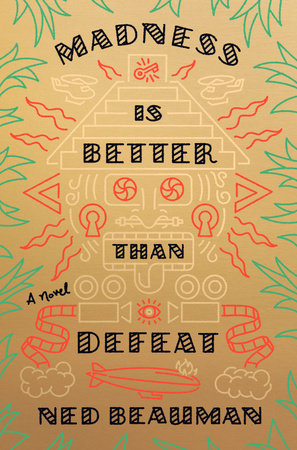Go back a few decades in the realm of pulp storytelling, and they abound: stories of adventurers far from home, investigating ancient structures and discovering mysterious events there. There are entire subgenres dedicated to this, and the form has endured. While it’s not nearly as prevalent as it was in the early and mid-20th century, plenty of its DNA shows up in the Indiana Jones and Tomb Raider franchises. But the narrative template of a (generally white and male) hero uncovering lost cultures or artifacts from somewhere in Africa, Asia, or South America is one that hasn’t aged particularly well, and for good reason.
Embracing this narrative unconditionally can mean embracing a whole lot of racist, sexist, and/or colonialist baggage—not the greatest of storytelling decisions. More recent tales of adventure in distant lands have sought to correct this: a whole essay could be written about the arc of the Uncharted series of video games, the latest of which centers the narrative around two women of color. Mat Johnson’s Pym riffs considerably upon Edgar Allan Poe’s The Narrative of Arthur Gordon Pym, but abounds with an implicit critique of the racial politics of Poe’s original story. Nevertheless, it’s also about a scientific adventurer facing impossible odds and uncanny adversaries while on a journey halfway across the world. Johnson’s novel is a prime example of how these older storytelling conventions can still charge a narrative in the present day, as long as a writer is willing to address the aspects of it that haven’t aged well.
And so, this brings us to the case of Ned Beauman’s Madness Is Better Than Defeat, which on the surface has plenty of familiar pulpy elements. There’s a mysterious temple in a remote jungle in Honduras, abundant secrets and duplicity, warring factions within the espionage community, betrayals, violence, and struggles among the wealthy and powerful. In telling this complex story, has Beauman found an equally deft way of bringing pulp tropes to the present day without stumbling, or are we dealing with a complex structure around a potentially retrograde plot?
Buy the Book


Madness is Better than Defeat
The short answer: yes, mostly. The longer answer involves delving into the plot somewhat—and if this seems ornate, the answer is that it’s meant to be. Late in the book, one character sketches out a theory of overlapping and interwoven stories which becomes increasingly complex, like the point at which metafictional dreams become cosmic horror nightmares.
Madness Is Better Than Defeat opens in 1959, with narrator Zonulet, an ailing CIA agent, reviewing a host of evidence pertaining to a particular case that’s somehow ensnared him. It has something to do with “Hearts in Darkness, the most ill-starred movie in Hollywood history,” and, given that a lifetime of alcoholism is killing him, it’s unclear whether or not he’ll survive to make his way to the end of the evidence before him.
Cue a flashback to 1938 and a scene in which Elias Coehorn Jr., scion of a wealthy family, is making a series of increasingly ill-fated bets on a man wrestling an octopus. His father dispatches him to a jungle in Honduras to retrieve a temple, to be reassembled as part of his estate. On the other side of the country, a neophyte film instructor and theorist named Jervis Whelt is hired to direct a film—also at a temple in a jungle in Honduras. Two groups converge on the same space and, unable to find a resolution to their conflicting needs, wind up spending a prodigious amount of time camped out in the shadow of a temple—which, it soon becomes clear, holds secrets and potentially uncanny properties of its own. Which is how both camps end up living in the jungle for years, forming unlikely connections and creating a bizarre microcosm of the society that produced them.
As befits a novel in part about the making of a film and in part about the nature of storytelling, Beauman is not shy about adding references to a host of books and movies along the way—some playful, some sharper in tone. Among the epigraphs are nods to an unmade Orson Welles adaptation of Joseph Conrad’s Heart of Darkness and the fiction of Jorge Luis Borges. Beyond that, there also apparent nods to Malcolm Lowry’s Under the Volcano, Werner Herzog’s Fitzcarraldo and The White Diamond, and—given an allusion to a harrowing series of possibly supernatural killings in Red Hook early in the book—H.P. Lovecraft.
If that seems somewhat excessive, you’re not wrong: Beauman brings an everything-but-the-kitchen-sink approach to the telling of this story. As it grows more and more complex, subplots arise dealing with everything from the logistics of manufacturing film stock in the jungle, one actress grappling with her feelings surrounding an affair with her niece, numerous riffs on the CIA’s Cold War interference in Central America, a mysterious and elusive Irish fixer, and the question of whether or not ancient gods are meddling in these affairs. And that’s before a Nazi on the run shows up; Meredith Vansaska, an old reporter colleague of Zonulet’s, resurfaces with crucial information; and the mysterious history of Elias Coehorn Sr. comes to the forefront.
To state the obvious, there’s a lot going on here. Throughout, Beauman largely pulls off having it both ways. Madness Is Better Than Defeat largely works as both a pulp adventure novel—there’s a terrific action setpiece on the exterior of the temple at one point—and a critique of some of the same attitudes that have caused archetypal pulp action novels to be cringeworthy at times. The question of whether or not a supernatural presence is at work in the novel has a neat solution, and Beauman largely keeps all of the multiple timelines at play here in order.
That said, the sense of excess here can occasionally feel overwhelming, and several of the characters’ arcs come to an abrupt or mysterious end. (Vansaska and Zonulet are the only two who really come off as fully-formed—though they’re also the lead storytellers in the narrative, so that may be intentional.) The handling of the novel’s primary queer character sometimes feels like Beauman trying to undermine certain tropes about tragic fates while still referencing them narratively, leading to one of the few dissonant moments in the narrative. And while the complexity of the plot ends up becoming part of the plot, it at times feels like this version of Madness Is Better Than Defeat is a truncated version of another version of it that’s closer to 600 pages in length.
To an extent, that even more sprawling theoretical version of Madness Is Better Than Defeat has an appealing ring to it. For all that it doesn’t always click, this novel’s blend of narrative deftness and classical riffs makes for a remarkably spry read. Cliffhangers, mysteries, and revelations abound, and the twenty-year scope of the narrative allows for a host of interesting shifts in the character dynamics. All the same, that a novel hearkening back to an earlier age of show business summons up the old saying about “always leave them wanting more” is no surprise. And sometimes getting too bogged down in a project means that you lose track of time; suddenly, the campground where you thought you’d be for two weeks turns out to be your home for a decade. Sometimes you need an ending—and given the indecision that bedevils many of the characters in Madness Is Better Than Defeat, that the novel in which they dwell has one that works was probably for the best.
 Tobias Carroll is the managing editor of Vol.1 Brooklyn. He is the author of the short story collection Transitory (Civil Coping Mechanisms) and the novel Reel (Rare Bird Books).
Tobias Carroll is the managing editor of Vol.1 Brooklyn. He is the author of the short story collection Transitory (Civil Coping Mechanisms) and the novel Reel (Rare Bird Books).










